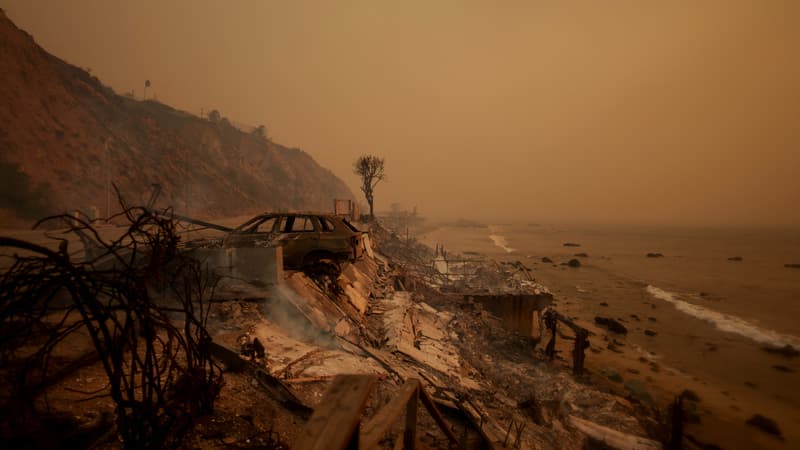The fires that are devastating Pacific Palisades and Malibu, two exclusive areas of Los Angeles, will be the most expensive ever in California, estimate experts, who expect an increase in premiums in a region underserved by many insurers.
JPMorgan analysts’ estimates of the total amount of damages and insured losses have doubled in less than 24 hours, now reaching 50 billion and 20 billion respectively. And the flames continued to advance on several fronts.
These record levels already far exceed the Tubbs (2017) and Camp (2018) fires, for which the estimate of insured damages amounts, according to sources, to 16 billion. The value of the homes makes the difference: at this point, more than 10,000 buildings have been destroyed this week, the vast majority of homes with an average value of three million dollars. By comparison, about 18,000 buildings were destroyed in the Camp Fire, but the average home value was $500,000.
There is no risk of lack of compensation according to experts
According to David Burt, founder and CEO of the climate change financial risk consulting firm DeltaTerra, the market value of the 15,400 homes in Pacific Palisades reaches almost $13.5 billion. However, experts believe that insurance companies will have no problem compensating their clients.
According to the rating agency Standard and Poor’s, insurers begin the year with comfortable reserves thanks to the good financial results obtained in two years and have significantly reduced their presence in Californian regions highly exposed to fire risks. They are also well diversified.
JPMorgan thinks the same, insisting that at this point housing guarantees will mainly be requested and, to a lesser extent, coverage for companies/businesses and automobiles.
“There has been a mass exodus of big market players in this part of California,” Ben Keys, a professor specializing in real estate and finance at the Wharton School of the University of Pennsylvania, said during a conference on Friday. He said the contract non-renewal rate has been “huge recently” in the state.
To recover insurance companies, it will be possible to increase contributions
California Insurance Commissioner Ricardo Lara announced this Wednesday protection, for one year, for the owners of the areas affected and surrounding these fires, against non-renewal and termination of guarantees. These types of measures protected more than one million contracts in 2024.
In 1968, the coastal state created a public insurance system, called FAIR, for homeowners who could no longer find a private insurer.
This “bandaging was supposed to be temporary, the moment when people move from one insurance policy to another, but now it extends much further,” Keys lamented, specifying that his exposure had increased from 50 billion in 2018 to more of 450 billion. dollars currently. To recover companies, Lara also initiated a reform that authorizes them to increase contributions as long as they do not apply any geographical exclusion.
“No more selective elections” to select the best contracts, summarized Susan Crawford, a climate and geopolitics specialist at the Carnegie Endowment for International Peace. According to her, “the acceleration of ferocious climate phenomena (…) should awaken awareness that things must change.”
Meanwhile, Californians – and perhaps even Americans – can prepare for tariff increases. Because the year 2025 is just beginning and the previous year was marked by very destructive disasters.
According to the models of the specialized site AccuWeather, hurricanes Hélène (September) and Milton (October) caused damages of between 160,000 and 180,000 million and 225,000 to 250,000 million respectively. He estimates the total cost of damage in Los Angeles at between $135 billion and $150 billion. The United States Department of State published a new national strategy on climate change on Friday, specifying that catastrophes related to this phenomenon (droughts, fires, floods, winter storms, hurricanes) caused economic losses worth 182.7 billion of dollars in 2024, double that in 2023. .
Source: BFM TV


